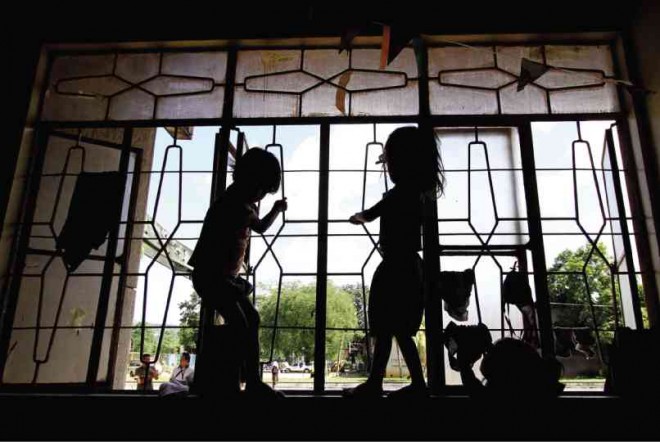‘Rescued’ street families homesick

STREET dwellers from Manila find ways to amuse themselves at the Boystown Complex in Parang, Marikina City, where they have been staying for more than a week following their “rescue” by social workers. RICHARD A. REYES
STREET dwellers rounded up last week by the Manila City government, supposedly because of the ongoing Asia-Pacific Economic Cooperation (Apec) summit, are pleading to be released from the Manila Boystown Complex in Marikina City, citing poor living conditions and the loss of their livelihood.
Ramona Rodriguez told the Inquirer which visited the facility Tuesday that she and her 9-year-old son Adrian were rounded up on Mabini Street on Nov. 11 by Manila social workers who told them they would be interviewed for the government’s Modified Conditional Cash Transfer Program for families who are either homeless or living in makeshift houses.
Rodriguez, a street sweeper and cash-for-work beneficiary since October, said she told the social workers that she was already enrolled in the program. However, she and her son were still brought to Manila’s Reception and Action Center (RAC) where they were informed that they would be taken to Boystown as “there will be visitors coming [to Manila] for the Apec [summit].”
The facility located in Marikina’s Barangay Fortune and operated by the Manila City government, serves as a rehabilitation center and orphanage for homeless and abandoned boys. Since renovations are being undertaken at RAC, street dwellers rounded up by the local government are brought to Boystown where they are temporarily housed and undergo skills training such as massage therapy so that they can look for employment following their release from the facility.
Eduardo Pascua Jr., however, said that he lost his source of livelihood when he and his family of four were taken from Arranque Market on Nov. 10 also by Manila social workers who told them they were to be interviewed on why they were living in the streets. Pascua added that he doesn’t know what happened to his merchandise of secondhand cell phones which he was forced to leave behind.
Article continues after this advertisementA week since they were brought to Boystown, Pascua, Rodriguez and 22 other families have been decrying their continued stay at the facility, noting that they are better off fending for themselves on the streets.
Article continues after this advertisementPascua said that while they are fed three meals a day, these are “insufficient” and given late. For example, breakfast is served most of the time at 9 a.m., lunch at 2 p.m. and dinner at 8 p.m., he told the Inquirer. They are given either porridge, noodles or sardines. Tuesday’s lunch of chicken tinola, on the other hand, was served past noon.
Aside from the complaints about food, Verlita Alejandro, who was with her year-old son, also decried the lack of diapers, medicines, as well as medical personnel to look after their needs.
These complaints reached the office of Manila Mayor Joseph Estrada who visited them Tuesday to check on their condition and, at one point, gave candy to the children. When he asked if they were being cared for and had enough food, they said yes but added that it wasn’t enough.
When Estrada asked if there was a doctor looking after them, Rodriguez answered that there was none. His reply apparently irked Estrada who told them not to lie while presenting to them the facility’s doctor. Rodriguez and other families, however, later told the Inquirer that it was the first time they saw the doctor.
In a chance interview, Estrada denied that the families staying in the facility were rounded up because of the ongoing Apec summit, saying they were free to leave the facility once social workers have assessed that they have homes to go back to instead of living in the streets.
Estrada also maintained that the rounding up of street dwellers to “take care of their well-being” was a continuous program of the city and that it was “intensified” only because of the Apec summit.
“It would be embarrassing because we have foreign visitors. What would they say about the Philippines? This is our country. We need to take care of our country’s image,” the former President told reporters.
“Do you want foreigners to see [children and families] sleeping in the streets? [Do you want them to say] that Filipinos [do not take] care of their poor countrymen?” he said.
Pascua, however, said that “if the government really wants to help us, they shouldn’t hide us.” He added that instead of rounding them up whenever foreign dignitaries are in the country, “the government must help us through programs that would help us succeed in life.”